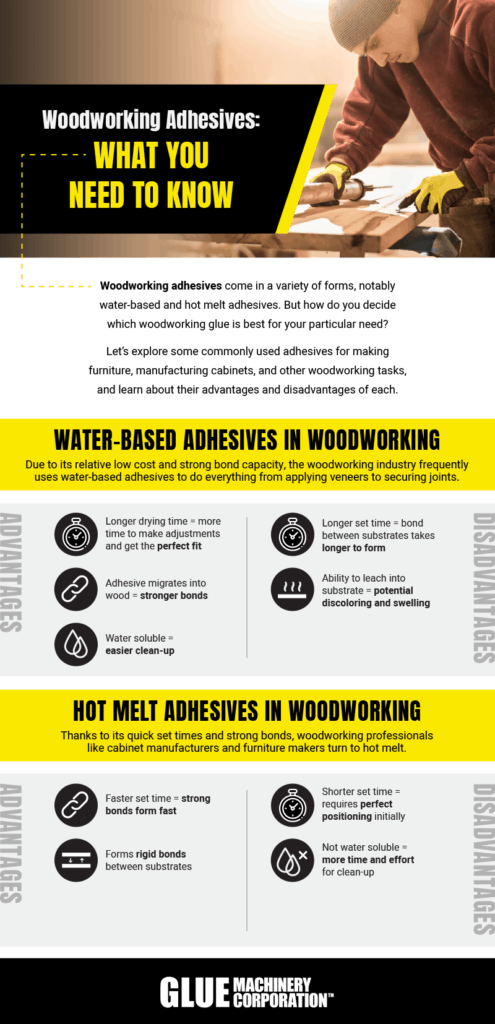Woodworking Adhesives: What You Need To Know
Updated: July 09, 2019

There are many different types of woodworking adhesives used in the industry, including both water-based and hot melt adhesives. Yet how do you decide which woodworking glue is best for your particular woodworking application? Let’s explore some of the most commonly used adhesives for making furniture, manufacturing cabinets and other woodworking tasks, and learn about the advantages and disadvantages of each.
Water-Based Adhesives in Woodworking
Due to its relatively low cost and strong bond capacity, the woodworking industry most commonly uses water-based adhesives like Elmer’s Glue and Titebond waterproof glue for wood to do everything from applying veneers to securing joints. In many cases, a fabricator manually applies the adhesive using a squeeze bottle, then compresses and clamps the substrates until the bond sets. Though as you might imagine, this manual application can have a huge impact on manufacturing speed and line efficiency. Some woodworking companies are trying to optimize the process by upgrading their application process to eliminate the squeeze bottle and move to automated systems. Water-based adhesives can be applied by adjustable-flow handguns and other equipment that can speed up the process while increasing accuracy and reducing waste.
Water-Based Adhesive Advantages and Disadvantages
There are a number of advantages and disadvantages associated with water-based adhesives.
- Advantage: Water-based adhesives have a longer drying time, which allows the fabricator to reposition and make adjustments as necessary to get the perfect fit.
- Advantage: Water-based adhesives migrate into the wood to create a strong bond.
- Advantage: Water-based adhesives are water-soluble, leading to easier clean up of the wood glue applicator and related equipment.
- Disadvantage: The longer set time of water-based adhesives requires that the substrates be clamped and held together for a long period of time, which can take valuable workspace and slow production.
- Disadvantage: Water-based glues can leach into the substrate materials, causing them to swell or discolor.
Hot Melt Adhesives in Woodworking
The use of hot melt adhesives is on the rise in the woodworking industry and is anticipated to keep growing. From the industry-leading hot melt Titebond to polyamide, EVA and polyurethane reactive hot melts, cabinet manufacturers and furniture makers use hot melts to create structurally sound, highly rigid joint bonds.
Hot Melt Adhesive Advantages and Disadvantages
Similar to water-based adhesives, hot melt adhesives come with their own set of advantages and disadvantages.
- Advantage: Hot melt adhesives provide a level of rigidity far above and beyond what water-based adhesives are able to provide.
- Advantage: Because of its quick cools and sets time, wood substrates joined using hot melt adhesives do not require lengthy clamping or setting time.
- Disadvantage: Unlike water-based adhesives that allow the fabricator to reposition as necessary, the hot melt’s fast cure time means you need to get the substrates in the perfect position the first time.
- Disadvantage: Because it is not water-soluble, cleaning and maintaining hot melt adhesive equipment typically requires more effort.
Let Glue Diligence Help Determine the Best Adhesive for Your Woodworking Needs
Certainly, there are a number of advantages and disadvantages to any kind of woodworking adhesive. While we hope this overview has been helpful, we understand that you may want a bit more guidance in determining which adhesive best meets your application, product, assembly and manufacturing speed requirements. That’s why Glue Machinery Corporation is pleased to offer our Glue Diligence service. For free, personal, expert advice on the adhesive that will best meet your woodworking company’s specific needs, call today at 888-202-2468.



